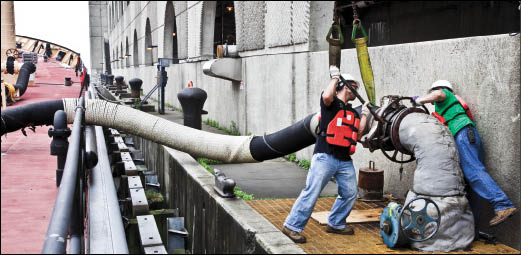By GREGORY N. HEIRES

Sewage Treatment Workers load sludge onto vessel in Manhattan.
Photo by Clarence Elie-Rivera, DC 37 AFSCME, AFL-CIO
New York City Mayor Michael R. Bloomberg’s assault on the pay of municipal blue-collar workers hit a roadblock May 4 when state Supreme Court Judge Manuel J. Mendez ordered the city to hold off on reclassifying the city’s 10,000 prevailing-rate workers into civil service categories that don’t have the right to appeal to the Comptroller for fair wages.
“Judge Mendez’s temporary restraining order is a strong signal that the city was out of bounds when it unilaterally adopted the reclassification plan, which we regard as a morally reprehensible assault on the wages and benefits of its blue-collar workers,”
Lillian Roberts, DC 37 AFSCME Executive Director, which represents 120,000 public employees in New York City, said.
Currently, under a century-old practice embodied in Section 220 of the state Labor Law, these workers can ask the City Comptroller to compare their pay with private-sector employees doing similar work and make an objective determination of a fair wage. The mayor’s plan would end this right for new employees and force them to negotiate with his Office of Labor Relations, a path to pay cuts and a two-tier wage system.
Union solidarity
Bloomberg unilaterally implemented the reclassification April 11, just two weeks after the Appellate Division of the state court system rejected the city’s appeal of Comptroller John C. Liu’s ruling that granted substantial pay increases to Laborers in DC 37’s Local 924.
Locals have won significant pay boasts under the Section 220 process for a number of other prevailing-rate titles whose pay fell behind private-sector blue-collar workers; the mayor’s move amounts to changing the rules to prevent future union victories.
Attorneys from a coalition of DC 37 and seven other unions worked together on legal strategies to block the mayor’s pay-cutting plan. New York state AFL-CIO President Mario Cilento, City Central Labor Council President Vincent Alvarez and Municipal Labor Committee Chair Harry Nespoli joined Roberts and other labor leaders in denouncing Bloomberg’s action April 19 at City Hall.
“It was inspiring to see the unions in the public and private sectors fighting the mayor together,” said James Tucciarelli, president of Sewage Treatment Workers and Sr. STWs DC 37 AFSCME Local 1320, whose members also won significant increases through the survey process. Tucciarelli called the judge’s temporary restraining order (TRO) “refreshing” at a time when unions and bargaining rights are under attack nationwide. “I believe the order shows that we are on strong legal ground and that the judge realizes that the mayor is trying to circumvent civil service law,” he said.
Observers believe the TRO is likely to stay in effect as the unions’ lawsuits to throw out the mayor’s plan are argued in state Supreme Court, where a hearing is set for June 13. “We feel vindicated by the judge’s order,” said DC 37 Sr. Assistant General Counsel Steven Sykes.
“Mayor Bloomberg thought he could unilaterally take away workers’ rights, but the unions have stuck together and used the law as a weapon to stop this attack,” said Assistant General Counsel Jesse Gribben, who worked on the suit with Sykes.
DC 37’s lawsuit charges that the mayor’s unilateral action:
- violates Civil Service Law by failing to get approval of the state Civil Service Commission for the reclassification;
- violates Civil Service Law by ignoring the city’s obligation to hold a hearing on its reclassification plan;
- is “arbitrary and capricious” because it would unilaterally establish a new pay scale and in effect scrap past collective bargaining agreements known as “consent determinations”; and
- would cause “irreparable harm” to new employees and the union itself by drastically reducing wages and benefits and undermining the union’s right to represent the Section 220 workers.
This is a revised version of an article that originally appeared in the June 2012 edition of Public Employee Press, the official publication of DC 37, AFSCME (AFL-CIO), representing 120,000 public employees in the City of New York.

